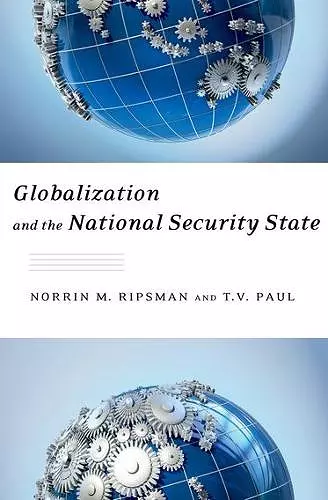Globalization and the National Security State
TV Paul author Norrin Ripsman author
Format:Paperback
Publisher:Oxford University Press Inc
Published:1st Apr '10
Currently unavailable, and unfortunately no date known when it will be back
This paperback is available in another edition too:
- Hardback£57.00(9780195393903)

In the past two decades, many have posited a correlation between the spread of globalization and the decline of the nation-state. In the realm of national security, advocates of the globalization thesis have argued that states' power has diminished relative to transnational governmental institutions, NGOs, and transnational capitalism. Initially, they pointed to declines in both global military spending (which has risen dramatically in recent years) and interstate war. But are these trends really indicative of the decline of nation-state's role as a guarantor of national security? In Globalization and the National Security State, T.V. Paul and Norrin Ripsman test the proposition against the available evidence and find that the globalization school has largely gotten it wrong. The decline in interstate warfare can largely be attributed to the end of the Cold War, not globalization. Moreover, great powers (the US, China, and Russia) continue to pursue traditional nation-state strategies. Regional security arrangements like the EU and ASEAN have not achieved much, and weak states - the ones most impacted by the turmoil generated by globalization - are far more traditional in their approaches to national security, preferring to rely on their own resources rather than those of regional and transnational institutions. This is a bold argument, and Paul and Ripsman amass a considerable amount of evidence for their claims. It cuts against a major movement in international relations scholarship, and is sure to generate controversy.
"Ripsman and Paul debunk loose generalizations about globalization's effects on the state and security policy. States today neither spend less on defense nor fight fewer wars than in less globalized eras. Globalization's effects, to the extent they exist, are not universal. The authors argue persuasively that states are the masters rather than victims of the process of globalization."--David A. Lake, Distinguished Professor of Political Science, University of California, San Diego "Ripsman and Paul neatly debunk critical key assumptions concerning the impact of globalization on the security actions of nation-states. Their conclusions will provoke healthy dissent and important debate among theorists and empiricists, both reflections of the essential and enduring quality of this compelling book."--Robert I. Rotberg, Director, Program on Intrastate Conflict and Conflict Resolution, Harvard University "The impact of globalization on the international system and on the national security strategies of states is a central question in the study of international relations, and Globalization and the National Security State makes an invaluable contribution. The detailed empirical analysis of consequences of globalization for the leading states in the system, for regional zones of peace, and for regions of rivalry and protracted conflict are particularly valuable. Not all readers will agree with the authors' argument that globalization has not radically transformed the international and regional security environments, but all will have to contend with their careful reasoning and systematic evidence."--Jack S. Levy, Board of Governors' Professor, Rutgers University
ISBN: 9780195393910
Dimensions: 155mm x 231mm x 20mm
Weight: 454g
296 pages